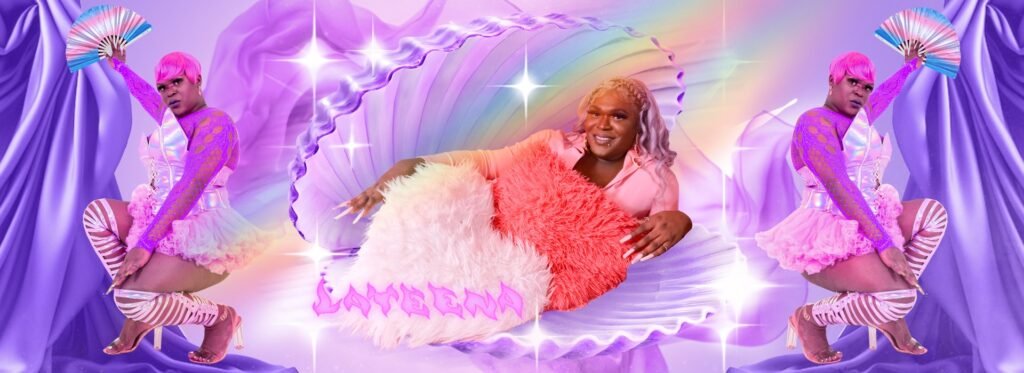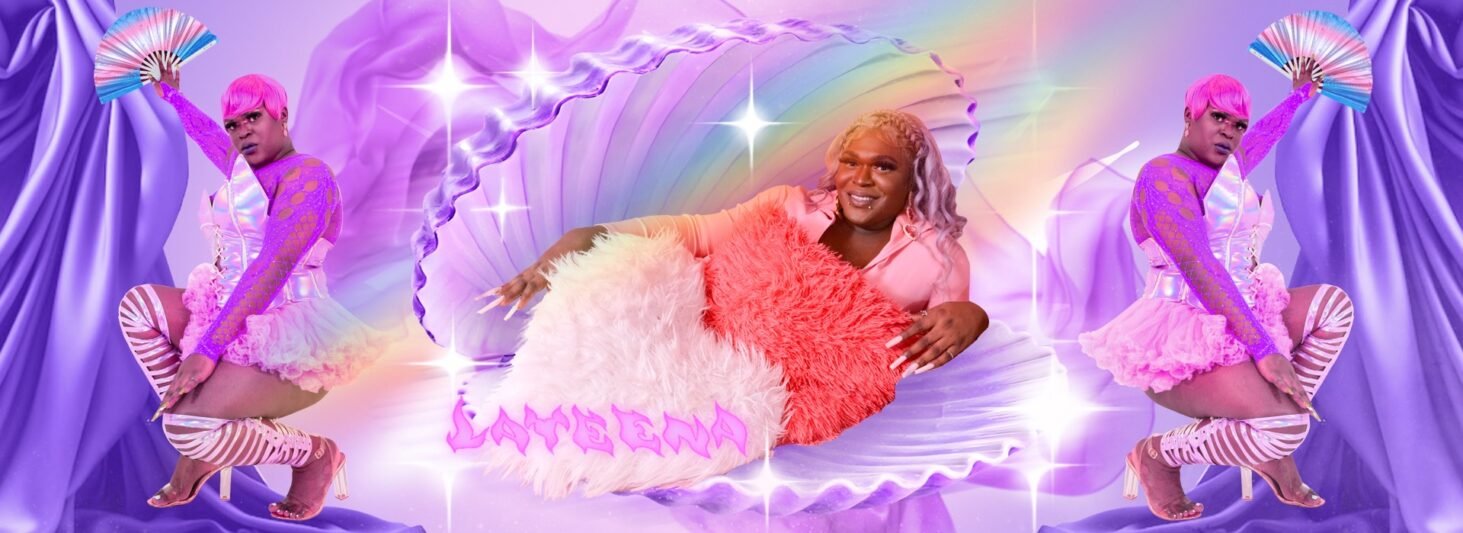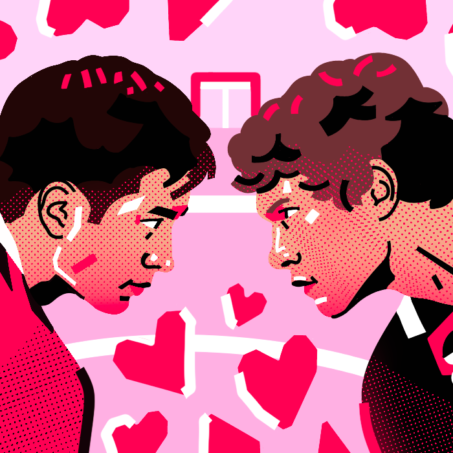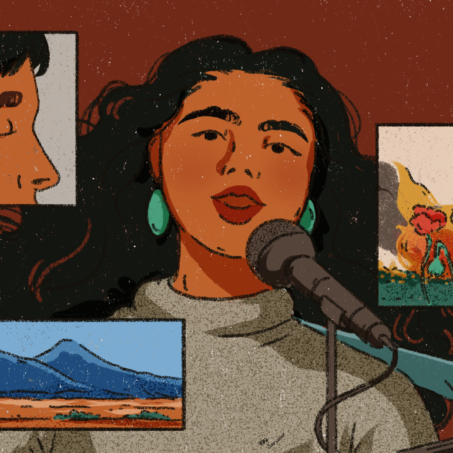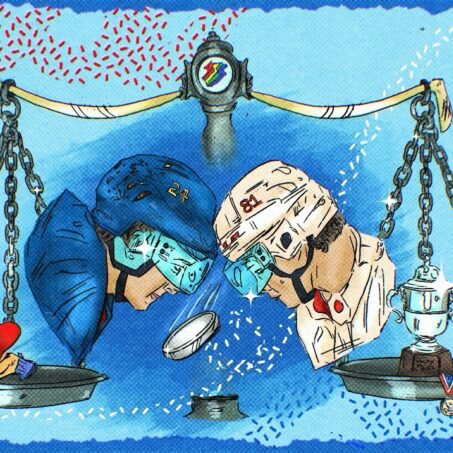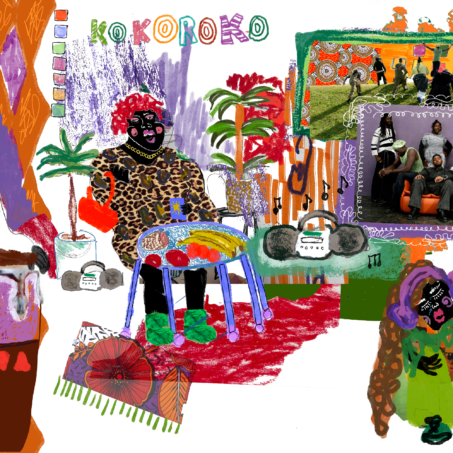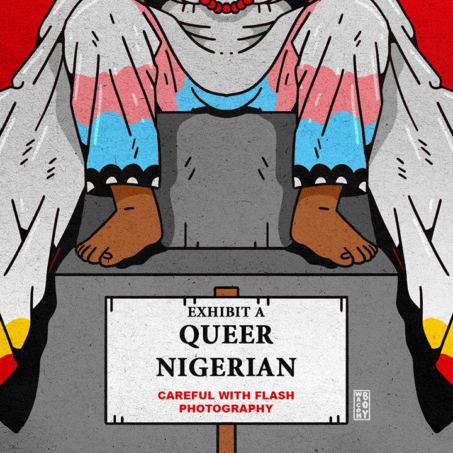Move over Hot Girl Summer, it’s time for Wicked Girl Era. There is a new self-love album to draw out the final weeks of summer – and behind its bolshy lyrics and roaring riddims, this is a love letter to trans young people.
Lateena. Not yet a household name but determined to become one. The self-described Dancehall Queen of Switzerland is staking her claim in your summer soundtrack with her latest album, Wicked Girl Era. As a trans woman in dancehall with lyrics that promote unapologetic self-love, Lateena is spearheading a reclamation of the genre. Interviewing her days before the album dropped feels like bearing witness to a rocket preparing to launch. She is palpably anxious, giddy and fired up all at once.
The woman behind the Queen
We start the WhatsApp call and I ask Lateena how things are in the lead up to the album’s release. Her response? “Beautiful.”
I’m relieved to see that she hasn’t been knocked by the setbacks with the album rollout. Lateena was due to fly to London for promotion and performances to spotlight Wicked Girl Era’s arrival on the scene but, thanks to the reliably harsh hostile environment, her visa was denied. Regardless, she’s unwaveringly certain of her oeuvre’s greatness. Though, a flicker of nervousness creeps in as she admits she’s been thinking about the interview and questioning how she’ll respond.
With a burgeoning but humbly sized platform boasting 3,077 monthly listeners on Spotify, it’s evident that Lateena isn’t fully accustomed to interviews. Though, perhaps the absence of media training is what made this interview refreshingly candid. Throughout the interview we touch on sensitive topics: homophobia and transphobia in Jamaica, spirituality, heartbreak, and more. Each time, Lateena endears me with her radical vulnerability. A true artist.
Destined for stardom from her teens, Lateena shares with me that she was on Jamaica’s national TV show, Rising Stars, designed to showcase emerging talent. From so early on, she was determined to take her talents to the stage and her star power has continued to burn bright.
Lateena is a self-described perfectionist. When I ask how that impacts her process as a musician, she responds without hesitation: “I think that’s what makes me a good artist, you know.” Though, she admits that this can mean that editing and production can often come down to the wire. I’m imagining her as a sculptor, chiselling to perfection.
Her determination to get things right is because she has a vision of building a legacy in the dancehall scene. When I ask about her process as a musician, and what she wants her music to evoke, she stresses it must be catchy, infectious, contagious. Repeated bars on her tracks are doing just that. The one I can’t get out of my head:
“We are the diva girls we control tha night. Independent once. Don’t ask twice.”
Though, when we get into the broader intentions Lateena holds for her music, I get the sense that she doesn’t just mean catchy lyrics. She is using her sonically captivating tracks to make her self-love infectious, spreading it to all but especially young people in the trans community.
Speaking to her hopes for the album, Lateena says she hopes that her music gives young trans people self-confidence and self-motivation. She pauses pensively and says she hopes it might bring comfort if they’re going through tough moments in life.
Being trans in Jamaica
It sounds as though Lateena is writing the music she wishes she could’ve listened to as a teenager. Lateena moved to Switzerland six years ago and confesses it’s only since being there that she has been able to fully be herself and speak boldly.
LGBTQI+ Jamaicans are still beholden to “buggery” laws, British colonial hangover legislation from 1864 which continues to criminalise them today. It’s not just in legislation but in exposure to discrimination and outright violence that queer Jamaicans face hardship. J-Flag, an LGBT rights organisation in Jamaica, published a report in 2014 called ‘Not Safe at Home’. Their research found that more than half of LGBT interviewees had been victims of some form of violence based on their sexual orientation or gender identity – some more than once.
Reflecting on her youth in Jamaica, she describes the country’s relationship to queer people as “volatile.” This, understandably, impacted how she moved through the world. Lateena explains that she had to have her walls up all the time to protect herself and be on her “Ps and Qs all the time”.
As we contemplate Jamaica’s future, Lateena admits a dejected outlook on the prospect of queer acceptance in the country. She speaks to homophobia and transphobia in Jamaica as deep-rooted because of misinterpretation and misunderstanding of the Bible. Despite this, she describes herself as a firm believer in Christianity and, with an air of certainty, she asked: “how could the Creator have his people and hate them?” As a fellow believer and part of the Jamaican diaspora, I felt proud to hear her say those words with such conviction – though I was still reeling from our discussion of the stark, unsafe situation on the ground.
Reclamation of our riddims
Dancehall has been critiqued for making unsafe, downtrodden, oppressed queer communities even more at risk by normalising and trivialising these realities. There is a prolific trend of lyrics that promote the objectification of women, as well as gender-based and sexuality-based violence. Lateena describes the homophobic and transphobic lyrics often spewed as “toxic and dominant.” That said, this dark underbelly could not blockade the spunky, defiant side of the genre.
From the late 80s, women in dancehall have been harnessing the genre as a site of reclamation. Though Lateena is vying for the crown in Switzerland, the internationally renowned reigning queen of dancehall, Lady Saw (who now goes by Marion Marie Hall), was the originator of this movement.
As former Professor of Literary and Cultural Studies at the University of the West Indies, Carolyn Cooper, writes: “the flamboyantly exhibitionist DJ Lady Saw epitomises the sexual liberation of many African-Jamaican working-class women.” This trend didn’t end with Lady Saw. From Spice’s track So Mi Like It which unabashedly discusses what brings her sexual pleasure, to Ishawna’s song Equal Rights which highlights the need for women to receive an equal amount of oral sex. Lady Saw, and the many women in dancehall who continued her legacy, reclaimed the riddims of dancehall, refusing to be objects and centring their own wants.
Jamaicans at home and in diaspora also sought to right the wrongs of the genre through the Stop Murder Music campaign. Launching in the early noughties, it sought to put an end to lyrics which spoke about harming or murdering queer people. In 2007, artists like Capleton, Beenie Man and Sizzla signed the agreement written by the campaign, entitled the Reggae Compassionate Act. Although this was a positive step, many popular artists allegedly refused to sign.
“Dancehall in the Caribbean tried to shove LGBT people out. They don’t want us to take up space in dancehall,” Lateena explains. Placing her music within this tapestry of violence and resistance, she tells me: “I see the dancehall I’m doing as reclaiming what’s been taken from LGBT people and creating a space for LGBT people.”

Join our mailing list
Sign up for shado's picks of the week! Dropping in your inbox every Friday, we share news from inside shado + out, plus job listings, event recommendations and actions ✊
Sign up for shado's picks of the week! Dropping in your inbox every Friday, we share news from inside shado + out, plus job listings, event recommendations and actions ✊
Even with the genre’s partial history of pushing positive change, the thread of queer self-acceptance that weaves throughout the fabric of her album is an anomaly in the genre. Underlining the intentions of her album, Lateena confirms: “Wicked Girl Era is something to empower LGBT people. To empower and to rebuild what dancehall has broken down.”
So, yes, Wicked Girl Era is making waves musically. It’s the eclectic fusion of dancehall with elements of dembow, rap and R&B which make this album sonically flirtatious, with surprises at each turn. But, importantly this album wants to make a splash in its impact, too. Wicked Girl Era is a love letter to trans young people, imbuing them with self-confidence and self-love. It’s also a message to the genre: trans Jamaicans are claiming their space and their power in dancehall, one album at a time.
What can you do?
- Stream Wicked Girl Era
- Listen to this playlist: Women of Dancehall | Female Artists from 1993 till 2025
- Read Carolyn Cooper’s paper, ‘Sweet & Sour Sauce: Sexual Politics in Jamaican Dancehall Culture’
- Read the Human Rights Watch (2014) Report ‘Not Safe at Home: Violence and Discrimination against LGBT People in Jamaica’
- Stream Stab Out The Meat by Lady Saw
- Stream So Mi Like It by Spice
- Stream Equal Rights by Ishawna
- Read more articles by Larissa HERE
